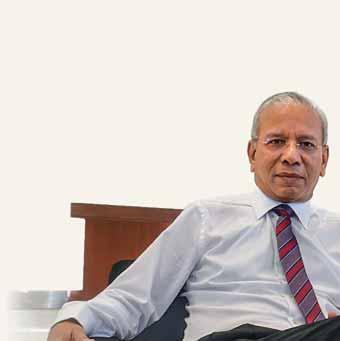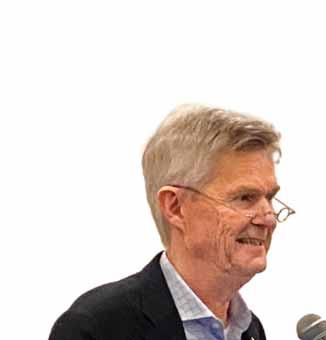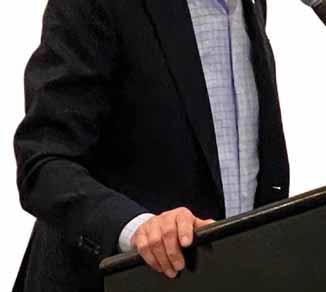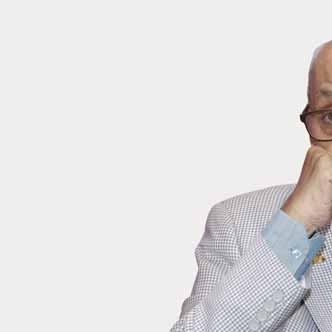
17 minute read
Let peace begin with us
Rotary’s peace programmes are not popular in our part of the world. It is a pity that we do not place much emphasis on them; I think we should,” said TRF Trustee Chair K R Ravindran addressing the virtual TRF seminar for zones 4,5,6,7 recently.
“Our peace programmes are the mainstay for many US Rotarians. They are attracted to the prospect that our Foundation tangibly contributes to world peace.” Beyond being a catalyst for drawing funds to the Foundation, the peace programmes have also produced some outstanding alumni who have contributed in their own way to the cause of peace, he added.
Advertisement
The Trustee Chair cited the success story of Manuela Mot, a peace scholar from Duke University, US, in bringing truce to the Mindanao islands in the Philippines, plagued with conflict for almost 60 years since 1960. “In 2019 she spent a month evaluating and processing a World Bank investment proposal on the island. This brought together the warring Christians and Muslims to the table because they all wanted the same thing — the vast infrastructure development in the island.”
Another great example of working for peace through service was the declaration of a polio-free Africa. “We applauded the health workers, mainly women, who travelled throughout the country with the polio vaccine to reach out to every child. Many of these places are riddled with conflicts. So we celebrated them this year by opening Rotary’s eighth peace centre, which is the first in Africa at the Makerere University in Uganda.”
Ravindran went on to narrate the genesis of the Rotary peace centres.
Jaishree
“At one time we wondered if Rotary can build a university dedicated to peace studies.” As the dream gathered dust, PRIP Rajendra Saboo, then a TRF trustee, got a brainwave to establish a peace centre at the prestigious Kellogs School of Business, an existing institution, instead of building a new one. He shared the idea with the then TRF Chair Paulo Costa and PRIP Luis Giay, and was authorised to form a committee. This was the forerunner to the present Rotary peace centres. Today there are eight peace centres in seven universities with the Duke University and the University of N Carolina in the US sharing one centre. The other centres are in Japan, UK, Australia, Sweden, Thailand and Africa. Fifty students graduate with a Masters’ degree in peace and developmental studies each year from these centres. “We may not be able to stop wars. But we are training enough individuals who can be placed in positions where they can negotiate for peace.”
He shared a close encounter with a war spillover at his home town in Colombo. It happened when a van, filled with plastic explosives driven by two suicide bombers, was stopped by six security guards at the gates of the Forward Command headquarters of the Defence Ministry in Colombo. The suicide bombers detonated the chargers
TRF Chair K R Ravindran and Trustee Gulam Vahanvaty

killing all eight. The roof of the building was blown off and about 15 houses in the vicinity, including Ravindran’s, suffered damages.
About 21 people were killed and 175 injured including the young children studying in the nursery wing of a school nearby. “This happened in June 1991 just before I took over as DG. When the bomb went off it shattered windows of my house more than a km away. My wife knew instinctively that it came from the direction of our daughter Prashanti’s school. That morning, one moment she was holding a new pencil she had bought at the school shop and the next moment she was flung to a side, the air filled with sand and her ears ringing. Everywhere around her she could see children running, screaming and bleeding. She remembers the roof collapsing, and everybody huddled on the ground with the teachers and waiting for their parents. We went and brought her home which was filled with broken glass and her favourite dog had splinters on its back.”
That war in Sri Lanka lasted 25 years. It killed 100,000 people and displaced countless more.
“Many of us think that peace is absence of war. Yet there are many who do not know what the absence of peace is,” said Ravindran.
He highlighted that last year 76,000 people died in Syria, around 14,000 in Afghanistan and 15,000 in Africa in the countries of the Boko Harem insurgency. A war does not end with a truce sign. The effects linger on the people who have gone through it — the financial impact, families that have lost breadwinners, infrastructure that never got built, the resources that were diverted for so many years towards the fighting. This apart, the trauma and the many memories that none of us can ever forget.
Referring to the song by Jill Jackson written in 1955 — Let there be peace on Earth — he said, “the second line tugs at my heart every time it is sung — Let there be peace on earth; and let it begin with me.” He added that peace must be enshrined in each one of us and must show in the way we conduct ourselves. “It means we must disagree in an agreeable manner and


Rasheeda Bhagat Many of us think that peace is
absence of war. Yet there are
many who do not know what
the absence of peace is.
K R Ravindran TRF Trustee Chair
limit our disagreement to that issue and move on.”
RI Director Kamal Sanghvi urged the incoming district governors to inspire Rotarians to give generously to the Foundation. “The saying that money cannot buy happiness is false. Your money can give happiness for the poor and the needy. This seminar will help you understand the magnanimity of the Foundation and the joy of giving,” he said.
RID Bharat Pandya alerted the delegates saying that the Annual Fund is lagging across the world. “It is the engine that drives the Foundation and if this scenario continues for the next five years, things will get derailed. Our service projects will suffer. It does not require a huge donation but any amount from $25 to $1,000 regularly would suffice,” he said.
TRF Technical Cadre Chair PRID Manoj Desai urged the DGEs to “invite cadre members to address your district TRF seminars. Their guidance will help you get your GG approved by the Foundation.”
RIDE Mahesh Kotbagi explained why some trustee decisions may not be suitable for some countries or districts. “Trustees have to think globally and cannot limit their plans to a particular region,” he said, and urged the DGEs to utilise their DDF for what they were meant for.

Trustee Gulam Vahanvaty, who anchored the seminar, appreciated the fact that India continues to retain its second rank in total giving to TRF for the fifth consecutive year. Until Dec 2020, donors from the four zones have contributed $5.7 million to TRF which is more than the figure during the same period last year. The total value of district and global grants for all four zones during 2019–20 was $41.7 million. In comparison, its value during the six months ending Dec 2020 has exceeded $25 million, he observed.
AKS members Ravishankar Dakoju, Dr Krishnendu Gupta and Vikram Reddy inspired the delegates to contribute generously to the Foundation and PDG Sam Patibandla spoke on how to become a Bequest Society member.
RIDE A S Venkatesh moderated a panel discussion titled Joy of Giving, in which AKS members Amita Anand Mohindru, past president of RC Delhi City; RID 3131 DG Rashmi Kulkarni and Saif Qureshi, past president of RC Bombay Pier, participated.
“A chat over coffee at Evanston with Ravishankar and Paola Dakoju inspired me to become an AKS member. I was reminded of the book, The monk who sold his Ferrari,” said Amita. If you are appointed trustee chair for a day what change will you want to bring to TRF? asked Venkatesh. Amita’s answer: “I would like to put in place an SoP for approval of grants. When I was president, I found one grant being approved in three


RI Director Bharat Pandya
months, but another similar one took six months. We were answerable to the corporates as CSR funds were involved and we didn’t have an explanation for the delay. Our reputation was at stake.” Rashmi said that she “liked the fact that the money we give to TRF through the Endowment Fund will come back to us as DDF and will help my club execute global grant projects, not just now, but also after we pass on.” She said more efforts should be made to educate people about the Foundation. “Still many think that it is a fundraising body. In truth, our Foundation does much more than that. Enlightening people about its power will encourage people to contribute liberally,” she added.
On how he would describe Rotary to his non-Rotarian friends, Qureshi said that generally when friends meet they discuss politics, economy or budget. “But when Rotarians meet we discuss service projects and the impact they create in communities. We share a common bond and passion for doing good in communities. The friendship among Rotarians is far deeper than a few drinks and food. We tend to hang out with each other like birds of a feather.”
Rotary must act now to save our planet: Holger Knaack
Team Rotary News
Making a strong pitch for saving the Earth in his address to the DGEs and DGNs, RI President Holger Knaack called upon Rotary clubs to ‘act now’. An essential part of serving humanity is “taking care of the planet and protecting it from the worst potential impacts of climate change.”
He reminded the delegates about the constant disasters around us — wildfires in Australia and California, storms in Central American and Pacific nations. “Our environment is under attack. And now, the environment is an area of focus for Rotary. It is high time for Rotary to act. And it is so important that we emphasise environmental concerns in our programmes and service projects,” said Knaack. Young people including Rotaractors want Rotary to take clear positions on ecological issues and “want us to show leadership with vision and solutions.” Recalling the pandemic months of 2020, he said, this has been “building for quite some time. Terrible pandemics have been predicted for years. And the transition to a digital, online world was well underway until Covid made it a necessity.”

New global village
But Rotary clubs across the world have faced these challenges by showing greater care for each other. “Our clubs have taken on an important mentoring role for members with businesses who are struggling through the pandemic. And we have learned that renewed focus on each other is often an important service work that we can all do.” Rotary clubs have endured a troubling period, but “we are surviving this crisis to become stronger.” Many have lost their jobs and businesses. Life has become more difficult for people everywhere, and more people than ever need help. “We have been forced to give up so much — not just simple handshakes but our entire way of life.” But this has not just been a year of loss. It has also been a year of new opportunities. “Social media and online connections have become more important. Now, we are all used to meeting virtually,” he added. A new global village has emerged with new social rules. People who normally would not look each other in the eye as they spoke have now become accustomed to doing so on zoom meets, he noted. “Today, physical distance is required. But we are now getting to know a whole new closeness.”
With new vaccines and treatments in 2021, he hoped the world would start to return to closer to normal. “But it will be a different normal and we have no choice but to embrace this (digital) age. Going forward, we will need to prepare carefully for unanticipated events. Adapting to the future also means connecting truthfully to ourselves,” he explained.
In Rotary, the five core values of service, fellowship, diversity, integrity and leadership form the basis for the organisation. “If we do not embrace all the values all the time, then it is just talk,” said Knaack. Rotary International has formed a Diversity, Equity, and Inclusion Task Force and taken strong steps to ensure that “Rotary meets and exceeds the diversity goals that we have established”.
Rotary is not just a club that you join. “It is an invitation to endless opportunities to service.” This was most notably evident in Rotary’s historic project to end polio, which made Rotarians’ lives richer and more meaningful, “with friends around the world based on our core values,” Knaack added.

Leading, in Rotary, means you are leading your equals: Kalyan Banerjee
Your office is only for one year and you would want to leave your mark. But if you try to start from scratch, to achieve something monumental in one year, you are going to fail. You need to look beyond yourself, and your year, at the long-term health of your clubs, communities and our organisation. That is how we get closer to achieving our vision,” said Past RI President Kalyan Banerjee, motivating the DGEs and DGNs at a session in the International Assembly which went virtual in February this year.
Greeting the district leaders world over, he said, “we are all connected today uniquely, only through our computers, iPads and cell phones, and in circumstances that are not only unusual but unprecedented. Let’s hope to see the end of this dreadful pandemic and rejoice together in a brave and safer new world.”
Reiterating the significance of Rotary’s core values and referring to the medical missions carried out by Indian Rotarians in Nigeria, and the American Rotarians in the Caribbean countries to help them recover and rebuild their homes after disastrous hurricanes, he said that friendship, diversity, integrity and “above all, our leadership, have all motivated us to engage in the service that we provide.”
Rotarians have always been leaders, he said, and highlighted the leadership of past RI presidents Rajendra Saboo “who conceptualised our unique peace scholarship programme, producing committed ambassadors to work for lasting peace around the world”; Sir



Team Rotary News
Clem Renouf “who inspired Rotary to take up very large international projects for the first time”; Luis Giay “who helped make our Rotary Foundation programme more focused, more impactful”; and Cliff Dochtermann and Carlos Conseco “who helped Rotary engage in our quest to banish polio from the world.”
In Rotary, part of the leadership is about being a role model. “Leading in Rotary is different because here you are leading your equals. You are not there to give orders; you are there to lend support,” said Banerjee.
Great leaders don’t ever set out to be a leader. They set out to make a difference. “It’s never the role. It’s always the goal,” he said, adding that good leadership is to help those doing poorly, to do well, and those doing well, to do even better. “If you take all the y qualities of a good leader, qualities of a good leader, and sum them up in one and sum them up in one word, then that word word, then that word would be ‘trust’. would be ‘trust’. Whatever happens, Whatever happens, great leaders are great leaders are never going to take more than their share of the credit or less than their share of the blame. He or she may not have all the answers, but they will tell you where to find them. They listen, motivate and inspire you.”
He left the district leaders to ponder and act on the thought: “Be the kind of leader of whom Rotarians in the district say, ‘if I am ever a district governor, I would like to be someone like him or her’. That is the gold standard of leadership.”
“When you start the 2021–22 year — and hopefully the new vaccines would have stabilised lives by then — the best thing you can do is to leave your district stronger than you found it. In the end, we need to remember that it does not matter who gets the credit,” he said.
Quoting former PM Indira Gandhi’s words: ‘There are two kinds of people p p in our world — those who do the in our world — those who do the work and those who take the work and those who take the credit,’ Banerjee advised the credit,’ Banerjee advised the district leaders saying, “Try district leaders saying, “Try to always belong to the to always belong to the first group. There is much first group. There is much less competition there.” less competition there.”
DGs must engage, retain members members John Hewko
Team Rotary News

The creation of 3-H Grants programmes designed to carry out large-scale service projects in the area of health, hunger and humanity, and second, the creation of PolioPlus are two major turning points in Rotary’s history, said RI general secretary John Hewko in his address at the virtual International Assembly.
In fact, the concept of transforming the health and well-being of others on a huge scale is now part of Rotary’s DNA. “Yet at the time these ideas were conceived they were considered almost revolutionary and the subject of intense debate,” he recalled. PRIP Jim Bomar spoke about this debate at the 1979 IA. He had received a letter from a Rotary member who said, “You know, we don’t need any changes. Everything is just all right. Let it remain as it now is.” And in response, Bomar asked whether keeping things as they were “will meet the tests and demands of the 21st century.”
There is a clear need to adapt Rotary’s policies and outlook to the changing world. And, thanks to the decisions of the RI Board, the Foundation trustees and the Council on Legislation, the 3-H programme was launched and a 55-year prohibition against corporate programmes in Rotary was overcome.
Thanks to PolioPlus, 19 million people who would otherwise have been paralysed are walking today and Rotary’s stature on the global stage has been elevated to a level we could never have dreamed of. “If the 3-H and PolioPlus programmes were clear turning points in Rotary’s 20th century history, the year of the coronavirus is a test of Rotary’s ability to adapt in the 21st . Although new and bold ideas might face resistance, if they are responsive to the need for Rotary to continually grow and prosper, they will prevail,” Hewko explained.
Service opportunities
If we think about 3-H and PolioPlus, they were ultimately supported by the vast majority of Rotary members for one reason: They provided opportunities for members to make an impact through service projects. “Remember, engaged members stay with Rotary, and through Rotary they can accomplish great things,” he said. And the variety of service opportunities to engage members today is even greater than before. “Whether you wish to mentor local high school students or participate in our newest cause, the environment, or our newest grant type, Programmes of Scale, there really is something for everyone at Rotary.”
New members must be given clear roles from the beginning, he said and cited an instance. The Rotary Club of Central Ocean in New Jersey, USA, implemented a Bring Your Own Project initiative to give new members the immediate ownership of something important to them. The club was able to complete nine service projects in the first half of one Rotary year and thereby engage and retain its newest members.
Now, in addition to engagement at the club level, fellowships and Rotary Action Groups connect members across the world who share a passion. “And to keep members engaged, we must also encourage them to make full use of the more than 600 courses in over a dozen languages available on the Rotary Learning Center. And they can also take the leadership development courses, thanks to Rotary’s alliance with Toastmasters,” said Hewko.
For most companies, “Covid has accelerated the adoption of digital technologies by several years, and some things will need to change permanently as we move forward.” The role of district governors is critical. “Now is your time to lead, shape a better world as we emerge from this crisis. And if you can engage and retain our greatest asset — our members — we can seize the moment and prepare for a better future.”
District governors are far more than administrators. “You are the agents of change and innovation. In the words of one of Rotary’s greatest innovators, the late PRIP Luis Vicente Giay, you are ‘the architects of the future’,” he said.






